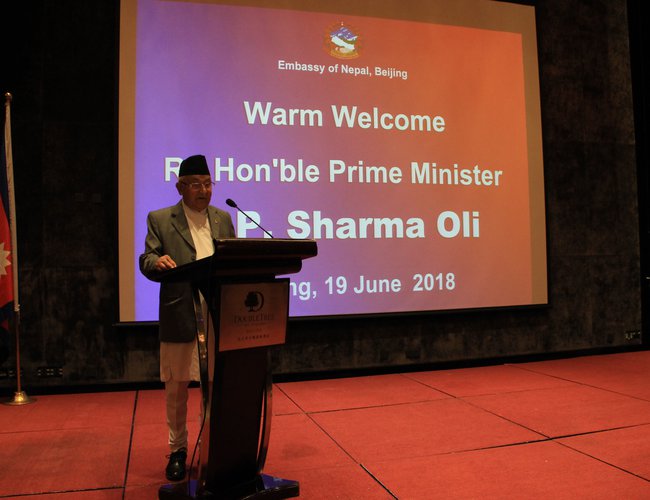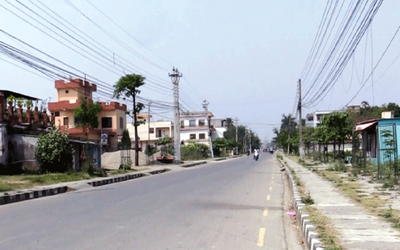
“I have Always Felt At Home In China,” PM Oli
Prime Minister KP Sharma Oli said that he always fells at home in China. A ddressing a reception held in his honor by Ambassador of Nepal to China Leela Mani Paudyal, upon his arrival in Beijing this evening, Prime Minister Oli urged Chinese investors to come to invest in Nepal.
Full Statement of PM Oli
I have always felt at home in China. In particular, I have very fond memories of my visit to the People’s Republic of China in March 2016 as Prime Minister of Nepal。
During that visit, we, the leaders of Nepal and China, agreed to elevate our bilateral relations to a higher pedestal.We signed important agreements on the areas of transit transport, connectivity, trade and investment, and co-operation.
We agreed to be partners-in-development under the Belt and Road Initiative.
We agreed to accelerate economic development in our respective countries, promote bilateral trade and investments, establish cross-border economic zones, and build cross-border railways and railways network in Nepal, and facilitate people-to-people exchanges.
In short, we embarked on a new chapter of our bilateral relations; we ushered in a new era of peace and prosperity for our peoples; we laid the foundations for a bright future for all.
I have come again to China with the treasure of deep trust and understanding between our two countries and with a new vision for Nepal-China relations in the new era.
Our relations are embedded in the history of civilizations between the land where Shakyamuni Buddha was born, and the birth place of Confucius.
The teachings of tolerance, compassion, moderation and harmony are our common heritage.
Such universal values of peace, friendship and harmony continue to guide our bilateral relations, and it is on the foundations of our shared values that Nepal and China will continue to prosper and flourish together.
Let me recall as an old Chinese proverb that says:
“If there is light in the soul, there will be beauty in the person
If there is beauty in the person, there will be harmony at home
If there is harmony at home, there will be order in the nation
If there is order in the nation, there will be peace in the world.”
Shakyamuni Buddha’s teachings also have a similar essence of peace, and compassion for every human being as the foundations of a harmonious society.
That strife and discord should give way to co-operation and harmony for collective well-being is the essence of the teachings of our fore-fathers.
Informed by similar cultural norms and values, Nepal and China have always stood beside each other in the past, achieved successes and supported each other at times of difficulties.
Therefore, Nepal and China will continue to work together in the future for common development and everlasting peace and prosperity in a spirit of mutual trust, friendship and understanding, and close co-operation and collaboration.
In such co-operative exchanges, I see the following as being important pillars of Nepal-China relations:
Transport and Connectivity
The rapid and phenomenal advancement of transportation technology has brought profound changes in contemporary society. Transportation is the backbone of an economy, whether in developed or developing status, and is a vital public good today. In fact, economic growth and socio-economic transformation are not possible without an infrastructure base, particularly in transport and communications.
Against this backdrop, the present government has placed high priority on developing transport networks within and across the border. I believe railway connectivity, in particular, is of vital importance to a landlocked country in order to reduce transaction and transport transit costs, diversify international trade and transit, and promote tourism and service sectors of the economy. Therefore, with a view to improve connectivity and trade, Nepal and China agreed in principle to develop railway network, across the Himalayas, during my first visit to China in March 2016.We are committed to taking forward this important initiative further, and develop the cross-border railway infrastructure to mark a new era in Nepal-China friendship and bilateral co-operation. In addition to railways, Nepal and China are also committed to developing multidimensional connectivity networks of roadways, airways, communications, and energy.
I strongly believe that such connectivity will inject enormous vitality in the regional economy by connecting Nepal’s economy with that of China, the world’s second largest economy. There is no doubt that efficient connectivity networks will put Nepal in the global value chain of production and distribution.
In addition, the north-south road corridors cross border transmission lines, and greater connectivity by air and telecommunications will bring enormous economic benefits to our peoples.
Indeed, greater connectivity between Nepal and China will transform and enhance the respective productive capacities of our economies, and create new opportunities for our peoples.
Tourism and Culture
Nepal lies at the confluence of not only physical topographies but also of ancient cultures and civilizations, creating a veritable paradise on earth. While Nepal is one of the world’s most fascinating destinations in terms of Cultural diversity, Natural beauty and Adventure Tourism, China has emerged as the source of the largest number of outbound tourists worldwide. By developing efficient connectivity networks, Nepal can benefit even more from the tourism industry while China can benefit from investment opportunities in the relatively unexplored hospitality industry of Nepal.
Trade and Investment
As important parts of the ancient Silk Road, both Nepal and China have benefited greatly from vibrant trade and commerce in the past. Nepal was a vibrant trade corridor for ancient China into South Asia. Both the countries should rejuvenate the Southern Silk Road and further boost their economies for mutual benefit. We should revive such robust economic exchanges between us, and create opportunities for our peoples.
Agriculture, Industries and Technology Transfer
Agriculture and industrial development through technology transfer are important areas for Nepal-China co-operation, which will create employment for the young people and rejuvenate rural livelihoods.
Unlocking Human Potentials
The resourcefulness, creativity and resilience of the Nepali people have received worldwide recognition and acclaim.
Similarly, the hard work, innovativeness and precision of Chinese people are well-known.
We need to unlock the full potentials of such exceptional manpower through adequate investments in health and education and skills development.
Nepal and China should work together to tap this reservoir of talents through mutual partnership and co-operation.
Natural Resources and Environment
Nepal possesses vast water resources as well as herbs, cool climatic zones, and natural diversity which can be harnessed together for common benefits. Developing clean energy for our own use and possible exchange of the surplus power is one of the most potential sectors for Nepal-China co-operation. I would like to call upon Chinese enterprises to take advantage of these vast investment openings by deploying their state-of-the-art technologies in power development for mutual benefits.
Co-operation and collaboration between Nepal and China on the above areas will create enormous opportunities for the two countries, and also institute a firm foundation for prosperity and well-being of our peoples for now and also for posterity.
Leaving behind uncertainty and long drawn-out political transition, we have now arrived at a critical juncture in Nepal’s political and economic history.
It is no ordinary feat that we have peacefully and successfully accomplished the task of electing representatives to three tiers of government, and put in place a system of grassroots democracy.
With these landmark achievements, Nepal has embarked on a new voyage of political stability and socio-economic transformation.
My dream of a ‘Sambriddha Nepal, Sukhi Nepali’ (Prosperous Nepal, Happy Nepali) is not just a dream but a mandate received from the people of Nepal, and we have no choice but to achieve it, within a stipulated time-frame.
To achieve this objective, I would like to call upon all, including our Chinese friends such as businessmen and entrepreneurs present here this evening, to join hands together in our journey of common development and shared prosperity.
Let me emphasize that you are all most welcome in Nepal.You are welcome to invest and do business in Nepal.We welcome you as most trusted and valuable partners in Nepal’s economic development.
Before I conclude, may I reiterate my full commitment and determination towards elevating Nepal-China ties to newer heights, and deepening them further in all aspects of our multi-dimensional relations for the benefit of our two peoples.
Nepali PM Oli to meet Chinese President Xi
Prime Minister KP Sharma Oli, who reached Beijing on Tuesday, is scheduled to call on Chinese President Xi Jinping today.
The meeting is scheduled to take place at the Great Hall of the People in the Chinese capital city. Prior to this, PM Oli will attend a function to be held at the Nepali Embassy. He would also meet Nepali nationals staying in China during the function.
Following the function at the embassy, the PM will attend China-Nepal Business Forum 2018 at China Council for the Promotion of International Trade (CCPIT) at the CCPIT auditorium in Fuxingmen Wai Main Street.
As per the PM’s itinerary for Wednesday, he is scheduled to give an interview to China International TV and receive President of the Asian Infrastructure Investment Bank Jin Liqun, who will call upon him at the Diaoyutai Guest House in Beijing.
- Three-Day Global Science-Policy Forum: Socially Inclusive Solar Irrigation Systems Concluded
- Apr 26, 2024
- Nepal And China Ink Two Agreements , PM Prachanda Meets Chinese Delegation
- Apr 26, 2024
- Nepal Army Held National Cyber Security Symposium
- Apr 26, 2024
- Nepal’s Investment Landscape Revitalize By Nine Ordinances: FNCCI President Dhakal
- Apr 26, 2024
- Weather Forecast: Partly Cloudy In Hilly region And Mainly Fair In Plain Areas
- Apr 26, 2024
















